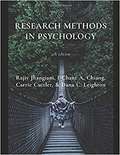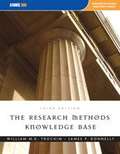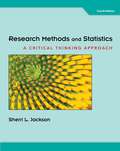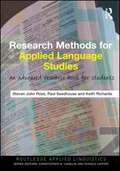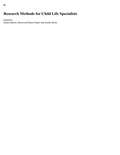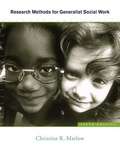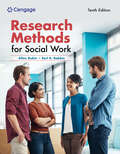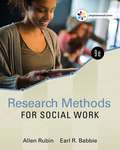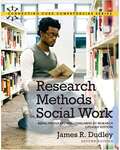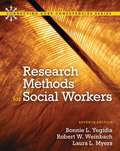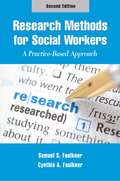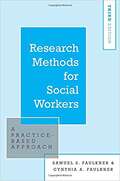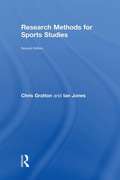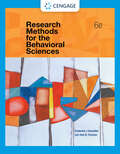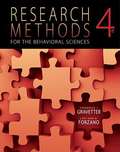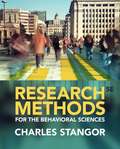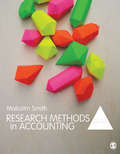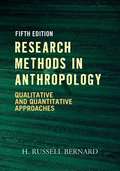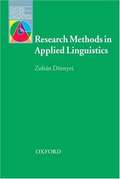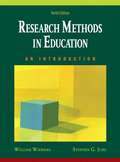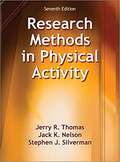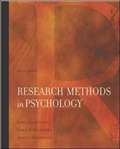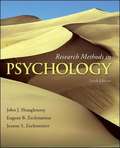- Table View
- List View
Research Methods In Psychology
by I-Chant A. Chiang Rajiv S. Jhangiani Carrie Cuttler Dana C. LeightonA comprehensive textbook for research methods classes. A peer-reviewed inter-institutional project. This adaptation constitutes the fourth edition of this textbook, and builds upon the second Canadian edition by Rajiv S. Jhangiani (Kwantlen Polytechnic University) and I-Chant A. Chiang (Quest University Canada), the second American edition by Dana C. Leighton (Texas A&M University-Texarkana), and the third American edition by Carrie Cuttler (Washington State University) and feedback from several peer reviewers coordinated by the Rebus Community. This edition is licensed under a Creative Commons Attribution-NonCommercial-ShareAlike 4.0 International License.
Research Methods Knowledge Base (3rd edition)
by James P. Donnelly William M. K. TrochimThis book provides coverage of quantitative methods and enhanced coverage of qualitative methods. It can be used in a variety of disciplines and is ideal for an introductory comprehensive undergraduate or graduate level course. Through its conversational, informal style it makes material that is often challenging for students both accessible and understandable. The Research Methods Knowledge Base, 3e covers everything from the development of a research question to the writing of a final report.
Research Methods MA Politics Final Paper 1, Final SDE Andhra University
by Prof. G. Srinivasa ReddyThis is the prescribed text book for students pursuing MA Politics at Andhra University, School Of Distance Education for the subject Paper 1 - Research Methods
Research Methods and Statistics: A Critical Thinking Approach,Fourth Edition
by Sherri L. JacksonRESEARCH METHODS AND STATISTICS: A CRITICAL THINKING APPROACH, 4e, successfully illustrates the integration between statistics and research methods by demonstrating the ways to use statistics in analyzing data collected during research. Jackson's combined text adopts an inviting narrative style that draws you into the material, helping you overcome the initial apprehension you may feel at having to learn both subject areas at once. She incorporates a student-friendly critical-thinking approach and presents examples and exercises to which you can relate. Jackson focuses on the logic of the process and the methodology aspect of research.
Research Methods for Applied Language Studies: An Advanced Resource Book for Students
by Keith Richards Steven John Ross Paul SeedhouseRoutledge Applied Linguistics is a series of comprehensive textbooks, providing students and researchers with the support they need for advanced study in the core areas of English language and Applied Linguistics. Each book in the series guides readers through three main sections, enabling them to explore and develop major themes within the discipline. Section A, Introduction, establishes the key terms and concepts and extends readers' techniques of analysis through practical application. Section B, Extension, brings together influential articles, sets them in context, and discusses their contribution to the field. Section C, Exploration, builds on knowledge gained in the first two sections, setting thoughtful tasks around further illustrative material. This enables readers to engage more actively with the subject matter and encourages them to develop their own research responses. Throughout the book, topics are revisited, extended, interwoven and deconstructed, with the reader's understanding strengthened by tasks and follow-up questions. Research Methods for Applied Language Studies: Provides an advanced introduction to quantitative and qualitative research methods used in second and foreign language learning, teaching and assessment Takes readers step by step through the processes of research, from formulating research questions to writing up a dissertation or report. Employs a wide variety of carefully structured tasks and discussion points to guide the reader through the key themes, frameworks and procedures of applied language research, including ethnography, conversation analysis and quasi-experimental designs. Engages students in readings and tasks on articles from leading names in the field, including Alison Mackey, Roy Lyster, Angela Creese, Junko Mori, Rod Ellis and Diane Larsen-Freeman. Is supported by a Companion Website, including data sets for practice and guides to writing a proposal, making recordings, conducting interviews, producing questionnaires and organising a dissertation. Written by experienced teachers and researchers in the field, Research Methods for Applied Language Studies is an essential resource for students and researchers of Applied Linguistics.
Research Methods for Child Life Specialists
by Sarah Daniels Sherwood Burns-Nader Jessika BolesIn todays evidence-based healthcare culture, child life specialists must demonstrate knowledge and skill not only in clinical care, but also in planning and evaluating the impact of their interventionsyet few resources exist to provide research skills and support for these practitioners. To adequately evaluate, improve, and innovate patient and family outcomes, it is essential that all providers understand the key inquiry pathways of research. <p><p>Combining clinical examples and skills with candid advice from seasoned child life specialist researchers, this text scaffolds the concept of inquiry into feasible units of action. From identifying a clinical question to assembling a team, designing a project, collecting and analyzing data, and reporting on results, it guides students, professionals, and administrators in actively exploring and improving healthcare outcomes for patients and their families. <p><p>Case examples from the authors own experiences as clinicians and researchers serve to demonstrate how to seamlessly translate clinical skills into those needed for success in research, ensuring that child life specialists remain active contributors to todays research evidence on the needs of children and families during healthcare encounters.
Research Methods for Generalist Social Work (Fifth Edition)
by Christine R. MarlowRESEARCH METHODS FOR GENERALIST SOCIAL WORK provides a clear, down-to-earth introduction to the concepts of research methodology. Marlow's accessible research methods text consistently demonstrates the link between social work research and generalist social work practice, making the methodology easy to grasp. The text helps you discover the relevance of research to social work practitioners.
Research Methods for Social Work
by Allen Rubin Earl R. BabbieIf you're intimidated by the thought of taking research methods, Rubin/Babbie's RESEARCH METHODS FOR SOCIAL WORK, 10th Edition, can help you overcome the fear associated with this course with its reader-friendly presentation of all aspects of the research endeavor. Students will appreciate the authors' clear and humorous writing style as well as the depth and breadth of coverage of current issues regarding social and racial justice. The text strikes a balance of quantitative and qualitative research techniques, illustrating how the two methods complement one another and can be integrated in the same study. Real-world examples highlight connections between research, social work practice and social justice. Comprehensive, friendly, accurate and integrating the best of technology, the text is widely considered the best for the research methods course -- and when you read it, you'll see why.
Research Methods for Social Work (Empowerment)
by Allen Rubin Earl R. BabbieWidely considered the best text for the course, RESEARCH METHODS FOR SOCIAL WORK, Seventh Edition strikes an optimal balance of quantitative and qualitative research techniques--illustrating how the two methods complement one another. Allen Rubin and Earl R. Babbie’s classic bestseller is acclaimed for its depth and breadth of coverage as well as the authors’ clear and often humorous writing style. Combining a rigorous and comprehensive presentation of all aspects of the research endeavor with a thoroughly reader-friendly approach helps students overcome the fear-factor often associated with this course. Relevant examples from real-world settings consistently help students see the connections between research and social work practice. In response to the move toward teaching evidence-based practice throughout the curriculum, the new edition also enhances coverage of evidence-based practice as well as keeps the text in line with other accreditation requirements based on the recently revised EPAS guidelines. Comprehensive, friendly, accurate, and integrating the best of technology, RESEARCH METHODS FOR SOCIAL WORK, 7e is an excellent text that can be used across undergraduate, graduate, and doctorate levels of study.
Research Methods for Social Work: Being Producers and Consumers of Research (Connecting Core Competencies)
by James DudleyWith its practical and accessible writing style, Research Methods for Social Workers, second edition, offers numerous examples from the field of social work and emphasizes how research and social work practice are connected. CSWE-mandated areas of social work are emphasized. <p><p> With over 25 years of teaching research and social work practice course, the author understands first-hand how practice and research are connected and how vital they are to each other. <p><p> Each chapter reflects and integrates the core competencies in the 2008 Educational Policy and Accreditation Standards (EPAS) set by the Council on Social Work Education (CSWE). End-of-chapter assessment reinforces this integration, and MySocialWorkLab.com activities support the mastery of CSWE's core competencies.
Research Methods for Social Workers
by Bonnie L. Yegidis Robert W. Weinbach Laura L. MyersThis social work research methods text is written in an accessible, reader-friendly style and includes numerous examples of how research can be used to inform social work practice. It is part of the Connecting Core Competencies Series that integrates CSWE's core competencies and practice behaviors throughout.
Research Methods for Social Workers: A Practice Based Approach (Second Edition)
by Samuel S. Faulkner Cynthia A. FaulknerSamuel and Cynthia Faulkner have developed the perfect research methods text tailored specifically for social work students that illustrates how understanding research is valuable for success in evidence-based agency practice. From the basics of research to practice evaluation, the authors carefully guide students through the complete process. They are able to connect abstract theory with practical applications, providing the skills necessary to become effective practitioners. The book introduces complex concepts such as qualitative, quantitative, and statistical methods; ethical issues in research; sampling; and measurement in a manner that students find readily accessible. What is most impressive about this new edition is that there is an additional 30% of new or updated material. Developed in part from suggestions made by students and faculty who have used the previous edition, these improvements include content and instructional features that will remind you why this is one of the best research methods books on the market! Features: NEW CSWE Core Competencies at the beginning of each chapter. NEW Practice exam at the end of each chapter. NEW! Case scenarios in each chapter demonstrating practical use of material along with associated critical thinking questions. NEW! Survey research chapter illustrating how to develop and conduct survey instruments. NEW! Example research proposal and example research report demonstrating how research is effectively gathered, processed, and presented. NEW! Examples throughout the text relating to social work practice.
Research Methods for Social Workers: A Practice-Based Approach
by Samuel S. Faulkner Cynthia A. FaulknerFrom the outset, the ultimate goal of Research Methods for Social Workers has been to serve as a research text that students would be able to understand and read in full. This third edition features important additions and changes to the original text (while maintaining its accessible style). <p><p> The order of chapters is re-arranged to improve the flow of introducing and developing concepts of the research process, and the authors have included some much-needed information to meet the changing and evolving standards of social work education. At its core, this book is designed to bring complex ideas down to a level that can be grasped by someone with little to no knowledge of research methods - it is an invaluable resource for social work students and anyone who wishes to have a comprehensive introduction to research methods.
Research Methods for Sports Studies (2nd edition)
by Chris Gratton Ian JonesThis comprehensive, accessible and practical textbook provides a complete grounding in both qualitative and quantitative research methods for the sports studies student. The book offers the reader a step-by-step guide to the research process, from designing a research project, to collecting and analyzing data, to reporting the research, and is richly illustrated throughout with sport-related case-studies and examples from around the world. Now in a fully revised and updated new edition, the book covers key topics such as: choosing an appropriate research design undertaking a literature review key research techniques, including questionnaires, interviews, content analysis and ethnographic studies data analysis, including an introduction to SPSS, as well as guides to descriptive and inferential statistics writing a research report ethical issues in sports research. Research Methods in Sports Studies is designed to be a complete and self-contained companion to any research methods course and contains a wealth of useful features, such as highlighted definitions of key terms, revision questions, practical research exercises, and a companion website with web links, multiple choice questions, powerpoint slides, and other learning resources. The book is also an invaluable reference for any student undertaking a dissertation or research project as part of their studies. Visit the companion website at: www.routledge.com/textbooks/9780415493932
Research Methods for the Behavioral Sciences
by Lori-Ann B. Forzano Frederick J GravetterIn RESEARCH METHODS FOR THE BEHAVIORAL SCIENCES, 6th Edition, Fredrick J Gravetter and Lori-Ann B. Forzano help students see how interesting and exciting experimental and nonexperimental research can be. The text leads students through the research process from start to finish, including tips and strategies for generating research ideas and hypotheses, selecting measures and participants, and designing research. This step-by-step approach emphasizes the decisions researchers must make at each stage of the process. The authors avoid a "cookbook" presentation by linking terminology with applied concepts; their "lecture in a book" style emphasizes clear, thorough explanations. Research examples present topics of particular interest to students, and content throughout the book reflects current APA guidelines.
Research Methods for the Behavioral Sciences (4th Edition)
by Frederick J. Gravetter Lori-Ann B. ForzanoBestselling statistics author, Fredrick J. Gravetter, and co-author Lori-Ann B. Forzano have written a text for research methods that helps students see how interesting and exciting experimental and non-experimental research can be. Inviting and conversational, RESEARCH METHODS FOR THE BEHAVIORAL SCIENCES, Fourth Edition, leads students through the research process from start to finish. The text opens with tips and strategies for generating research ideas, moves to selecting measures and participants, and then offers an examination of research strategy and design. This step-by-step approach emphasizes the decisions researchers must make at each stage of the process. The authors avoid a "cookbook" approach to the facts by linking terminology with applied concepts; their "lecture in a book" style makes the text accessible to students by emphasizing discussion and explanation of topics. Each chapter ends with a set of student exercises and activities. Examples and content throughout the book reflect the most current APA guidelines.
Research Methods for the Behavioral Sciences (Fifth Edition)
by Charles StangorThe author provides succinct explanations for a full range of methods, including descriptive, correlational, experimental, and quasi-experimental research designs.
Research Methods in Accounting
by Malcolm SmithDesigned solely for accounting students and scholars, this easy-to-follow and engaging text will ensure that you can successfully apply the most relevant research methods to your accounting research studies. New to this updated edition: Expanded coverage on how to successfully identify your research proposal question. Additional qualitative data chapter enabling you to have a stronger understanding of qualitative methods. Real-life accountancy examples provide insight into choices made by accountants, relating your theoretical research to practical application. Further reading at the end of each chapter to further enhance and expand your knowledge.
Research Methods in Anthropology: Qualitative and Quantitative Approaches (Reference, Information and Interdisciplinary Subjects)
by H. Russell BernardResearch Methods in Anthropology is the standard textbook for methods classes in anthropology. Written in Russ BernardOs unmistakable conversational style, his guide has launched tens of thousands of students into the fieldwork enterprise with a combination of rigorous methodology, wry humor, and commonsense advice. Whether you are coming from a scientific, interpretive, or applied anthropological tradition, you will learn field methods from the best guide in both qualitative and quantitative methods.
Research Methods in Applied Linguistics
by Zoltan DörnyeiA comprehensive overview of research methodology in applied linguistics which describes the various stages of qualitative and quantitative investigations, from collecting the data to reporting the results.
Research Methods in Education: An Introduction (9th Edition)
by William Wiersma Stephen G. JursA classic in its field, Research Methods in Education explains the research process with emphasis on the formulation of a research question, referencing current literature in the field, using appropriate research designs, and writing and evaluating research reports. Both quantitative and qualitative research designs are described. Measurement, sampling, and statistics are presented as essential research tools. Retaining the clear, concise writing style and organization that has made this text so popular,Research Methods in Education helps students evaluate research literature as well as master research methodology. It emphasizes the rationale for commonly used research procedures and their applications. The authors outline the nature of educational research and clearly define the steps in the research process. The text is broad in scope-covering both quantitative, qualitative and mixed methods research methodologies as well as describing how to write research proposals and reports of completed research. Research Methods in Education gives students a solid understanding of all the elements of research.
Research Methods in Physical Activity
by Stephen J. Silverman Jerry R. Thomas Jack K. NelsonResearch Methods in Physical Activity, Seventh Edition, systematically guides students through the research process, introducing methods and tools specifically for kinesiology and exercise science disciplines, including the subdisciplines of physical therapy, rehabilitation, and occupational therapy. The seventh edition leads students and novice researchers to research competency with the distinctive humor that has become a trademark of this internationally recognized text. <P><P> This text provides step-by-step information for every aspect of the research process, from identifying and devising research questions to analyzing data and compiling results for presentation. Methods for qualitative, quantitative, and mixed-methods research approaches are addressed, and real-world research questions—including historical, experimental, epidemiological, and philosophical—are presented by scholarly contributors who give suggestions for approaches to follow. Photos, anecdotes, and humorous stories are used throughout the text to put students at ease and emphasize key points through practical applications. Enhancements to the seventh edition include the following: • Updated information and techniques for electronic searches to ensure students use best research practices • New information on meta-analysis and the benefits of journal-style writing that teach readers to evaluate and prepare data for scholarly journals and publication • Special attention to ethical issues to help readers understand the regulations involved in using human and animal subjects • New information on logistic regression that aids in the understanding of complex ideas • Further explanation of qualitative and mixed-methods research approaches, in addition to quantitative approaches, to ensure readers use the most appropriate methodology for their research <P><P> The content of the seventh edition maintains and expands upon the logical content progression that has made Research Methods in Physical Activity the leading text in the field. <P><P> Part I presents an overview of the research process, including problem development, preparation of the research plan, and understanding ethical issues in research and writing. Part II introduces statistical and measurement issues in research, and part III presents various types of or approaches to research and methodology from expert researchers in the field. Part IV includes a writing guide for result findings and details how to develop and organize research papers and presentations. Statistical tables and guides are available in the appendix. <P><P> To aid instructors, Research Methods in Physical Activity, Seventh Edition, includes a suite of ancillary materials featuring an instructor guide, test package, an extra data set for instructors who wish to create specialized learning activities, and presentation package plus image bank. <P><P> Research Methods in Physical Activity, Seventh Edition, instills in students the confidence to devise, collect, analyze, and present their research in a competent manner by systematically guiding them through the research process. It is an essential text for all emerging researchers in physical activity.
Research Methods in Psychology
by Eugene B. Zechmeister John J. Shaughnessy Jeanne S. ZechmeisterConsidered one of the best undergraduate method texts in the field for the past two decades, Research Methods in Psychology captures the excitement of psychological inquiry as well as the importance of understanding the methodology that is used to conduct research. The text has been praised for its clear writing, logical organization, depth of coverage, and wide variety of examples from different fields of psychology. The new edition includes updated research, a thoroughly revised introductory chapter, and improved pedagogical features designed to enhance students' learning.
Research Methods in Psychology
by Eugene B. Zechmeister John J. Shaughnessy Jeanne S. ZechmeisterPsychologists use a variety of research methods and tools to learn about behavior and mental processes. The goal of this book is to introduce students to the “multimethod approach” to research in psychology, including observational, survey, and experimental methods. Students learn the strengths and weaknesses of each method, as well as ethical dilemmas when using them, so that they can become competent practitioners and thoughtful consumers of psychological research. Our approach is to engage students in the research process by describing contemporary research in psychology. Students learn about recent topics such as online dating and Facebook, cross-cultural observations of helping behavior, PTSD in orphaned chimpanzees, Medicaid and Medicare health outcomes, decision-making during Hurricane Katrina, clinical research and DSM-5, and much more. Each chapter's “stretching exercises,” “stat tips,” review questions, and challenge questions develop students' critical thinking about the psychological research that appears in scientific journals and in popular media. Together with the companion Online Learning Center for students, the 10th edition of Research Methods in Psychology provides a clearly written, compelling introduction to research methods in psychology.
Research Methods in Psychology
by Paul C. PriceYears before this book was a Flat World Knowledge textbook, Paul Price wrote an extensive series of handouts to replace the textbook he had been using for his psychological research methods course, and he posted them online for his students. The advantages of this were that 1) students had a streamlined presentation of the most important methodological concepts in psychology, and 2) they could access it online for free. Paul turned his book into a proper textbook by having it reviewed, edited and published with the full set of ancillaries by Flat World Knowledge so not only could his students get the materials for free, but so could yours. Although the content of Research Methods in Psychology is fairly traditional--making it easy for you to use with your existing courses--it also emphasizes a fundamental idea that is often lost on undergraduates: research methods are not a peripheral concern in our discipline; they are central. This why the overarching goal of this textbook is to present the basics of psychological research methods--focusing on the concepts and skills that are most widely shared within the discipline--emphasizing both their centrality to our field and their contribution to our understanding of human behavior. The book will include several features that will help accomplish this overarching goal. The Core Concepts: Dr. Price based his choices about content and terminology on the most influential original books and articles in the research methodology literature--as determined by an empirical analysis of the reference lists of secondary sources. He also relied on the Undergraduate Psychology Major Learning Goals and Outcomes document commissioned by the APA. Although many of the research methods outcomes in that document are addressed in all research methods textbooks (e.g., "Describe how various research designs address different types of questions and hypotheses"), others are rarely mentioned (e.g., "Recognize the limitations of applying normative conclusions to individuals"). The Examples: The text includes examples drawn from the entire range of contemporary psychology, including abnormal, clinical, and counseling psychology. Dr. Price also chose examples to show how psychological research has fundamentally changed what we believe to be true about human behavior (for example, in the area of eyewitness memory). The Style: Dr. Price concentrated on making the style of this book both straightforward and engaging. If you are looking for a new research methods textbook for your psychology course that has been used by "teachers" and is thorough in its content, you will find your book in Paul Price's Research Methods in Psychology. Order a desk copy and see for yourself.
